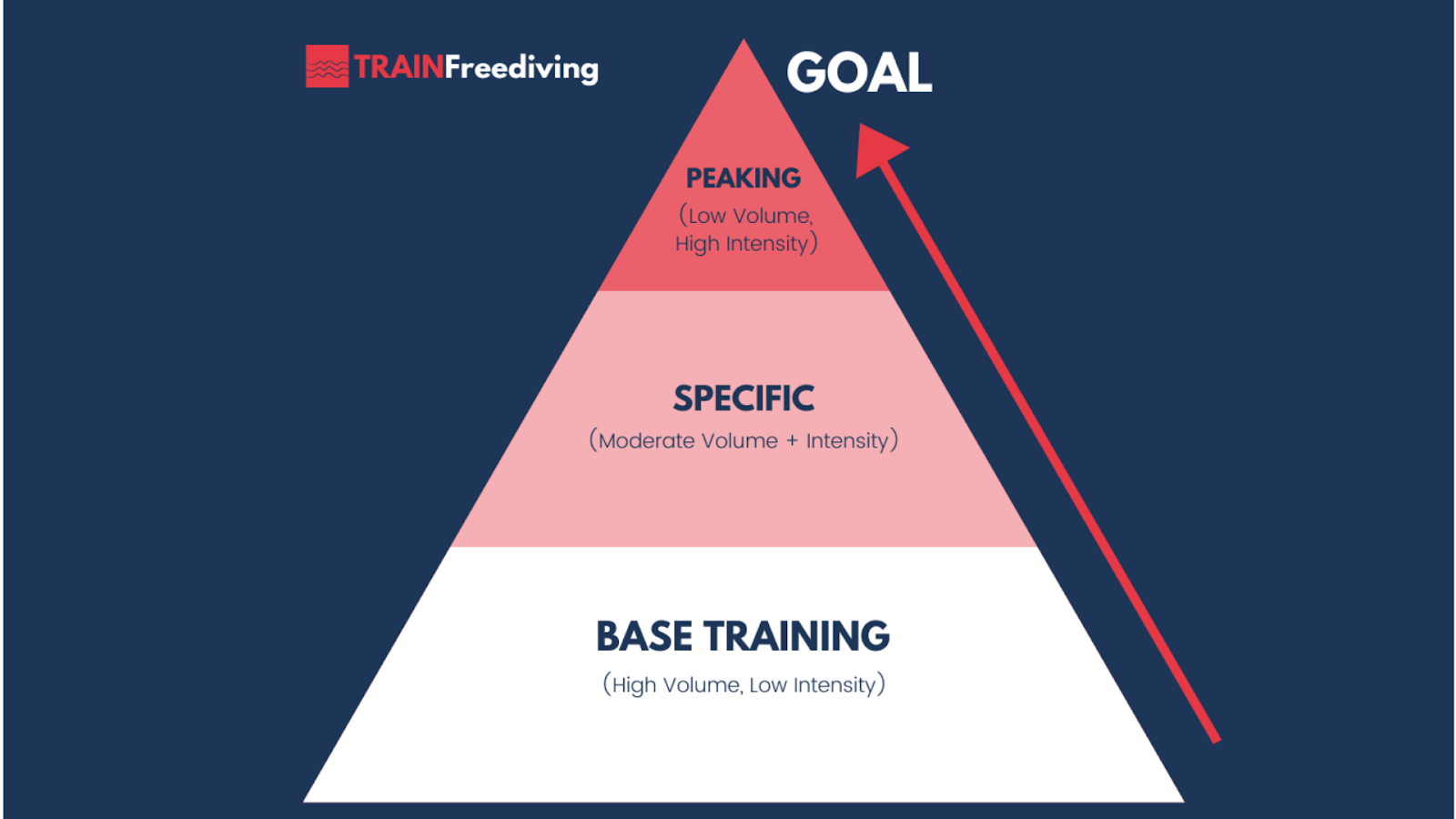How To Prevent Freediving Plateaus And Set New Personal Bests Using Training Cycles

Put simply, we can define a freediving training cycle as a time period dedicated to training for a specific goal or event.
A training cycle needs to have a start and a finish date, and we can further break it down into separate phases, a beginning, middle, and end to the cycle.
Your aim as an athlete is to achieve maximum level sport-specific performance at the end of your freediving training cycle, not at the beginning or in the middle.
(More on the three phases of the cycle in upcoming articles)
Cyclical progression in freediving
In sports science, building your sport-specific fitness to peak at the end of your training cycle is called ‘cyclical progression’.
This means that your maximum performance increases only when you reach the end of each training cycle.
It is an entirely different approach to ‘linear progression’ when athletes attempt to increase their performance on each training session. Cyclical progression comes with plenty of advantages…
All top athletes in measurement-based sports - sports like freediving where performance is based on how long, how far, how heavy, how fast - use training cycles instead of attempting to progress linearly.
The main advantage of using a cycle is that it helps to prevent any type of plateaus in your performance.
A plateau is when you get stuck at a certain level.
Training Cycles Help You Avoid Getting Stuck
Typically, athletes become stuck, unable to improve their freediving performance because of one, or a combination, of a few factors. Either;
- Their skill-set isn’t developing quickly enough
- Their body or mind are not adapting to the demands of the sport quickly enough
- Their general fitness deteriorates, negatively affecting their sports performance.
- They suffer from ‘adaptive resistance’, where the body or mind no longer adapt to their training.
- They become systematically over-trained
One or more of these four things can quickly occur during a linear progression.
They happen when athletes spend too much time attempting maximum performances, which generally do not provide enough training variation and are too fatiguing to avoid the issues mentioned above. Cyclical progression, designed correctly, can prevent this. The way cycles work is by providing a structure and framework (defined by the phases) that promotes helpful degrees of training variation and limits maximum performances to when they count the most.
Think Of A Training Cycle Like A Pyramid

The bottom, the widest part, of the pyramid is represented by doing plenty of different training types, all far from your maximum. This promotes technical growth, improved general fitness, and allows plenty of time for the diver to adapt to their training before attempting maximums. As the cycle progresses, just like how the pyramid narrows to a point, the training becomes less and less diverse and closer and closer to maximum performances. This sharpens the freediver into someone who’s capable of performing consistent and high-quality dives, exceeding their personal best after each training cycle.
3. Accelerate Your Mastery By Working On Skills & Technique
There are many factors involved in deciding how to set up your personal training cycle. More advanced divers need longer cycles to get the same benefits that a beginner diver can get with just a few training weeks.
However, no matter what your level, using a cyclical progression will benefit your overall performance and experience training.
You’ll avoid getting stuck and creating mental barriers, you’ll improve your dive quality, and most importantly, the training process will feel easier and more enjoyable overall.
In summary, you’ll experience less stress, less work, and more performance. That's the benefit of using training cycles instead of linear progression.
Where next? Read about phase 2 of the training cycle –What is Base Training For Freediving? A Simple Guide To Planning Like A Pro.
Want to learn more about how to train most efficiently and effectively to progress as a freediver? Watch our on-demand workshop: Uncover 7 Secrets To Unlocking Your Potential And Setting New Personal Bests.